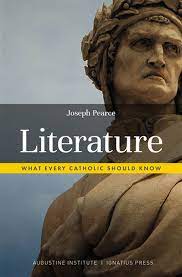Literature: What Every Catholic Homeschool Teen Should Know
Your teen can join Professor Joseph Pearce and learn about everything from the Greek epics to Shakespeare’s plays to Tolkien’s famous trilogy this summer. The Catholic online class Literature: What Every Catholic Should Know is an insightful introduction to the world’s rich depository of stories. Learn how great literature mirrors The Story—the Story of Salvation History and how it directs us back to the Storyteller, God himself.
To give you a little insight into what to expect, Professor Pearce has granted permission for us to share Chapter One from his book of the same title. To learn more about Professor Pearce’s book and other books in the series, please visit, What Every Catholic Should Know.
Chapter One: Why Should Every Catholic Know About Literature?
 There is a very good reason for every Catholic to know the great works of literature—and that is because the great works of literature help us to know ourselves. This is the reason that we should learn the humanities – because the humanities teach us about humanity, both our own humanity and the humanity of our neighbours.
There is a very good reason for every Catholic to know the great works of literature—and that is because the great works of literature help us to know ourselves. This is the reason that we should learn the humanities – because the humanities teach us about humanity, both our own humanity and the humanity of our neighbours.
In the great works of literature we discover a deep understanding of man’s being and purpose. We discover that the human person is homo viator, a pilgrim or wayfarer who journeys through mortal life with eternal life always in mind. This understanding of who we are has been lost. “The modern man,” wrote Chesterton, “is more like a traveller who has forgotten the name of his destination, and has to go back whence he came, even to find out where he is going.” In fact, things are even worse than Chesterton imagined because modern man has not only forgotten the name of his destination, he has even forgotten that he has a destination. He does not know that he is a traveller. He is unaware that he is on a journey or that he has anywhere to go. He is not homo viator, but homo superbus, proud-man, a pathetic creature trapped within the confines of his own self-constructed “self,” a prisoner of his own pride and prejudice.
The great works of literature show us the folly of homo superbus as well as the wisdom of homo viator by contrasting the viciousness of the prideful villain with the virtuous humility and humanity of the noble hero. They show us that the good man is inspired in all that he does by the desire to serve his God and his neighbour, while the bad man is inspired by his desire to please himself. They show us that man is always oscillating between the two poles of his very nature. He is either falling into the folly of the idolatrous love of himself above all others, or he is edified by his selfless love for the other. Since this oscillation between sin and virtue is to be found in the heart of every man, it is also to be found at the heart of every age in history and in all the great works written throughout every age of history.
Viewing the panoramic vista of the history of the West, we can see three broad ages of man. The first of these ages is the pre-Christian or pagan age; the second age is the age of Christendom; and the third age may be called the age of Disenchantment.
In the pre-Christian or pagan age, the artists and philosophers examined the struggle between homo viator and homo superbus, perceiving the superiority of the former over the latter, albeit through a glass darkly.
In the age of Christendom we see, subsumed within the very fibre of the individual’s conscience and in the very fabric of human society, the affirmation of homo viator and the condemnation of homo superbus. Christendom’s chief characteristic is its overarching unity in the realms of philosophy and theology, a unity in which homo viator is not only admired but enshrined. In Christendom, sanctity and heroism are synonymous, with the absence of the one invariably leading to the destruction of the other. And since, for the orthodox Christian, sanctity is also synonymous with sanity, it was incumbent upon all men to overcome the temptations of homo superbus (the barbarian within ourselves) and to become perfect examples of homo viator (the saint as the epitome of the civilized man). In this sense the age of Christendom corresponds to the finest flowering of civilization. It is an age in which becoming civilized is the very goal of man’s existence because being civilized (holy) is the only means of attaining the perfect civilization of Heaven. It is, therefore, hardly surprising that the heart of Christendom—its theology, its philosophy, its painting, its architecture, its sculpture, its music, its literature—is the very incarnation of the integrated harmony, the wholeness and oneness, of its Founder.
In the age of Disenchantment, the wholeness and oneness of Christendom is lost in a progressive fragmentation of thought that continues to this day. From its earliest manifestation in the decay of the Christian humanism and neo-classicism of the Renaissance and its coming of age in the pride of the superciliously self-named Enlightenment, to its self-defeating victory in the nihilistic nonsense of deconstructionism, the age of Disenchantment represents the triumph of homo superbus over homo viator and, therefore, the triumph of barbarism over civilization.
At this juncture, we should remind ourselves that these three ages do not represent a linear progression in the “right” direction, as the denizens of the age of Disenchantment would have us believe, but a manifestation of the perennial struggle between homo superbus and homo viator, between barbarism and civilization. On the assumption that civilization is preferable or superior to barbarism, it could be said more truthfully that the age of Disenchantment represents a move in a wrong or regressive direction. In any event, it is certainly wrong to presume that Disenchantment has replaced Christendom, in the sense that it has somehow eclipsed or extinguished the age that preceded it. On the contrary, Christendom is alive and well and existing simultaneously with Disenchantment. This should not surprise us because homo superbus can never utterly or ultimately defeat homo viator.
Although the culture has become fragmented and disintegrated in the age of Disenchantment, the presence of Christendom within the age of Disenchantment can be seen in the magic or miracle of Re-enchantment. Many of the greatest works of art in recent centuries are not the products of disenchantment but of re-enchantment. The works of Shakespeare, Dryden, Coleridge, Wordsworth, Dickens, Dostoevsky, Chesterton, Lewis, Tolkien, Waugh, and T.S. Eliot, to name but an illustrious few, are inspired by a rejection of disenchantment and a desire for re-enchantment. And what is true of literature is true of painting (the Pre-Raphaelites), architecture (the Gothic Revival), and music (Bruckner, Mahler, Mendelssohn, Messiaen, Arvo Pärt, and others). This disillusionment with disenchantment represents a refusal to believe that reality is only the cold mechanism of the materialist or the meaningless mess of the nihilist; it is an awakening to the enchantment of reality, perceiving it as a miraculous harmony of being, a song, a Great Music, the Music of the Spheres. Hence the employment of “disenchantment” as the operative description of the process that calls itself the Enlightenment. The word enchantment derives from the Latin, cantare, to sing, or cantus, song, and the disenchantment of the Enlightenment was the shift from seeing nature as creation, that is, as a beautiful work of art sung into existence by God, to nature as something merely mechanical and, later, merely meaningless. Thus, in the age of Disenchantment in which we currently find ourselves, the struggle between homo superbus and homo viator manifests itself in disenchantment and re-enchantment.
The great works of literature are works of enchantment which have the power to re-enchant the most weary of souls. They are the inheritance of all of us, or all of us who want them. In reading these great works we find ourselves in the presence of great minds thinking about great things. We find ourselves in the presence of almost three thousand years of genius. We find ourselves in the company of the illustrissimi of civilization. In what better company could we possibly hope to spend our time? This side of the grave, there is no better company apart from the saints themselves. The better company, the best possible company, awaits homo viator after his temporal journey is over. In the meantime, and especially in the mean times in which we live, these great works of literature are good companions for the journey and excellent guides. Like the lembas which sustained Frodo and Sam on their journey through Mordor to Mount Doom in The Lord of the Rings, great literature is manna for the mind and food for the soul.
Reprinted with permission






